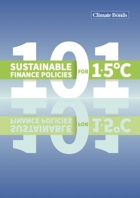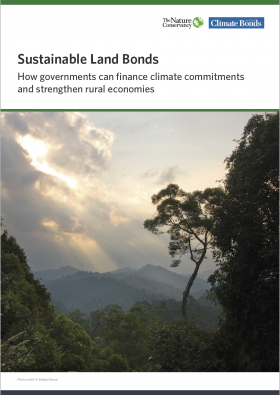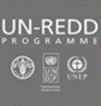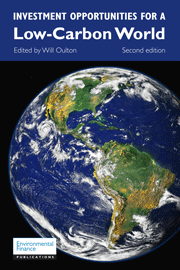ESS takes an active role in contributing to the development of innovative ideas to reduce environmental degradation and stimulate sustainable enterprises.
Biodiversity Impact Credits In collaboration with Botanic Gardens Conservation International, Queen Mary University University London and Green Gold Forestry Peru SA, ESS is facilitating pilot transactions in Biodiversity Impact Credits (June 2023). See: Conservation charity lines up massive project pipeline for biodiversity market

Climate Bonds Initiative ESS contributed to this 2023 guide, which provides a toolkit of 101 policy levers available to government, regulator, and central bank policy makers to facilitate the transition to net zero. See: 101 Sustainable Finance Policies for 1.5°C

The Nature Conservancy: Sustainable Land Bonds - How governments can finance climate commitments and strengthen rural economies. Co-authored by ESS, March 2018. See: https://www.climatebonds.net/resources/reports/sustainable-land-bonds-report

This report shows how tropical forest countries can tap mainstream bond markets and secure long-term capital at extremely low net cost through the issuance of Sustainable Land Bonds to finance the large-scale transition to sustainable and low carbon land management practices.
SLB financing can help countries achieve their Nationally Determined Contributions (NDCs) under the Paris Agreement while, at the same time, protecting the environmental infrastructure that supports rural production.
By doing this, governments can catalyze a virtuous cycle of inward investment, higher rural productivity and increased employment, as well as meeting their climate mitigation targets.
UN-REDD Programme: Lower the cost of financial capital to reduce exploitation of natural capital - a blog contribution by ESS, October 2014

There is a critical missing link in REDD+ thinking, and that relates to the high cost of finance for SMEs in developing countries, widely acknowledged to be the engines of economic growth. Yet SMEs face strong headwinds when it comes to accessing funding. For many SMEs, the unsustainable exploitation of natural resources – or “natural capital” – is a substitute for financial capital. See: http://unredd.wordpress.com/
Lima Climate Finance Week: ESS presented 'Bonds and Climate Finance' at Lima Climate Finance Week on behalf of the Climate Bonds Initiative. LCFW was held as part of the Peruvian government's build-up to UN Climate Change Conference (COP20/CMP10), which will be hosted in Lima in December 2014.
 To download a pdf of 'Bonds and Climate Finance'
To download a pdf of 'Bonds and Climate Finance' click here
Renewable Energy Covered Bonds: ESS co-authors Climate Bonds Initiative's proposals for adapting covered bond legislation to enable banks to use the market to access funds to on-lend in the renewable energy sector (May 2012)
![]()
To download a pdf of 'Renewable Energy Covered Bonds – how to adapt the covered bond market to bring capital into the low-carbon economy' click here
Investment Opportunities for a Low-Carbon World: ESS contributed to 'Climate Bonds - the Investment Case' in Environmental Finance's 2012 publication (http://www.environmental-finance.com/books/view/17)
 To download a pdf of 'Climate Bonds - the investment case' click here
To download a pdf of 'Climate Bonds - the investment case' click here
World Forum on Enterprise and the Environment 2011: ESS presented 'Forests, Deforeststion and Capital' at the 2011 WFEE held at the Smith School, Oxford University
 To download a pdf of ESS's WFEE 2011 presentation click here
To download a pdf of ESS's WFEE 2011 presentation click here
Forest Investment Review: The Forest Investment Review was published in June 2009 by Forum for the Future. It was commissioned by the UK’s Department for International Development and Department of Energy and Climate Change and examines ways to leverage public finance to stimulate private sector investment in reducing deforestation in the developing world. ESS contributed two of the Review’s five chapters.
 To download a pdf of the Forest Investment Review click here
To download a pdf of the Forest Investment Review click here
Meeting the Climate Challenge: Using Public Funds to Leverage Private Investment in Developing Countries: This Report was published in September 2009 and is the output of a public/private discussion coordinated by Lord Nicholas Stern, Chair of the Grantham Institute for Climate Change and the Environment at the London School of Economics. The main purpose of that discussion was to identify the most efficient instruments that Governments could use to leverage private finance and thereby enable sufficient financial flows to developing countries to achieve their mitigation and adaptation objectives. ESS contributed to Chapter four (pp30-41) which makes recommendations on how public finance can be used to stimulate private sector investment in reducing emissions from deforestation and degradation of forest land (REDD).
![]() Meeting the Climate Challenge (Stern) 2009 click here
Meeting the Climate Challenge (Stern) 2009 click here
World Forestry Congress 2009: ESS was invited to make a keynote address on ‘Building Investment Capacity for Forestry in the Financial Community’ at the FAO’s 13th World Forestry Congress in Buenos Aires in October 2009.
 To download a pdf of the WFC 2009 presentation click here
To download a pdf of the WFC 2009 presentation click here
